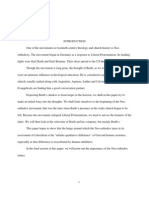Proposal 1: God is essentially immutable in himself. If not, it would certainly be imperfect, for those who change must change for better or worse; No matter what change someone suffers, that being must, ipso facto, become or be more excellent than it was or lose some excellence that he had. But none of this may be the case with the deity: it cannot change for the better, because it would necessarily imply that it was not perfectly good before; It can’t change for the worse because then it couldn’t be perfectly good after that change. Therefore, God is immutable. And it is the uniform voice of the scriptures. Why don’t I, the Lord, change? (Malachie 3. 6). ? [In it] there is no change or shadow of variation?(James 1. 17). But are you the same and your years will never end?(Psalm 102. 27).
Proposal 2: God also does not change absolutely his goals and promises. “God is not a man, that he may lie; nor son of a man, to repent; maybe he’d say, wouldn’t he?Would you talk and not confirm it?” (Numbers 23. 19). “The Israeli force does not lie or repent; Because he’s not a man to regret?(1 Samuel 15. 29). But if he’s solved anything, who’s going to turn it down?(Job 23. 13). I, the Lord, have said, live it, and I will, I will not return, and I will not forgive or repent (Ezekiel 24. 14). Are these God’s gifts and vocation without repentance?(Romans 11:29). Does he remain faithful and cannot deny himself?(2 Timothy 2. 13).
- By God’s purpose or decree we refer to his certain counsel.
- By which.
- Since all eternity.
- He has predestined all that he would do or do in time; in particular.
- This means their eternal designation of men for life and others for death.
- Whose designation derives entirely from his free and sovereign agency.
- Because he is not yet born.
- Nor has he done good or evil (so that God’s plan.
- According to choice.
- May stand firm.
- Not by the works.
- But by which he calls).
- Is he said: The greatest will serve the smallest How is it written: I loved Jacob and hated Elus?(Romans 9: 11-13).
The Apostle therefore anticipates an objection in the following words, which predicts that men of corrupt minds would do about it: “What shall we therefore say?That there is an injustice on God’s part?; To which he replies : “Not at all?And he solves the whole procedure of God with his creatures in his own sovereign and independent will, for he says to Moses 😕
We affirm that God’s decrees are not only immutable to God Himself, being incompatible with his nature to alter his designs or change his mind; but they are also immutable in relation to the objects of these decrees, so that everything that God has determined, in relation to each individual person or thing, will be safely and unfavably fulfilled in and upon them. gives mercy to the one who has decreed mercy, and hardens the one who resolved to harden (Romans 9:18); ?Why will your advice stay and do whatever you want?(Isaiah 46,10) Therefore, his eternal predestination of men and things must be immutable as much as he himself is immutable and, far from being reversible, he will never be able to admit the slightest variation.
Proposal 3. ” In the words of Gregory, “May God never depart from his decree, but often varies in his statements”: he is always safe and immutable; these are sometimes seemingly inconsistent. Then, when he condemned Nineveh for Jonah, saying, “Another forty days, and Nineveh will be overthrown?”[Jonah 3. 4], the meaning of the words is not that God absolutely intended at the end of this time to destroy the city, but that if God If they treated these people on their merits, they would be completely isolated from the earth and destroyed unless they repented quickly.
Likewise, when he said to King Hezekiah, through the prophet Isaiah: “Put your house in order, why will you die and not live?” [2 Kings 20. 1; Isaiah 38: 1], this meant that with regard to secondary causes and taking into account the poor state of health and the weakening of the king, he could no longer, humanly, live. Yet even so, the event showed that God had firmly decided that he would live another fifteen years, and so he placed in his heart the prayer for the ordained blessing; Likewise, in the case of Nineveh, mentioned above, God had resolved not to destroy that city at that time, and to carry out his own purpose in a way worthy of himself, he ministered to Jonah the means to guide these people. to repentance. All this, while showing that the absolute predestination of God does not exclude the use of means, it also proves that, whatever the diversity of God’s declarations (that is, when they refer to the consideration of natural causes), his councils and their designs stand firm and firm. unshakable, and they cannot admit a change in themselves, nor an obstacle to its realization. See this more fully in Martin Bucer’s Romans 9 exhibit, where you will find the certainty of divine designation firmly affirmed and irrevocably justified.

